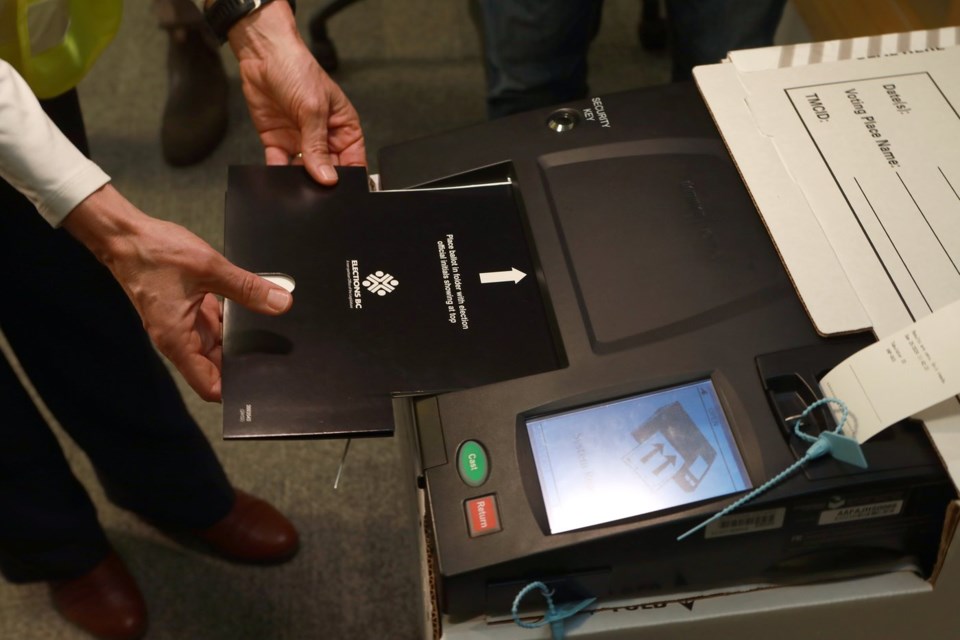British Columbians could find out who wins the provincial election on Oct. 19 in about the same time it took to start counting ballots in previous votes.
Andrew Watson, a spokesman for Elections BC, says new electronic vote tabulators mean officials hope to have the first results within 15 minutes of polls closing at 8 p.m., half of all votes counted within about 30 minutes, and for the count to be "substantially complete" within an hour.
Watson says in previous general elections — where votes have been counted manually — they didn't start the tallies until about 45 minutes after polls closed.
This will be sa���ʴ�ý's first general election using electronic tabulators after the system was tested in byelections in 2022 and 2023.
"The reason behind them is to provide better service to voters and to make the voting process more accessible," Watson said Thursday.
Voters will still mark their choice of candidate on a paper ballot that will then be fed into the electronic counter, while networked laptops will be used to look up people's names and cross them off the voters list.
Watson said the change from a paper voters list means people casting ballots won't have to stand at specific voting stations based on their names, and the process is expected to take an average of five minutes.
He said the electronic tabulator means voters will know right away if their ballot can't be read, something that wasn't possible under a manual system.
"So we're hopeful that that will reduce the rate of rejected ballots in the election, which is already low, but anything we can do to bring that number lower is, I think, beneficial for accessibility," Watson said.
One voting location in each riding will also offer various accessible voting methods for the first time, where residents will be able to listen to an audio recording of the candidates and make their selection using either large paddles or by blowing into or sucking on a straw.
The province's chief electoral officer recommended modernizing the voting system in 2018 and politicians passed the required legislation a year later. Watson said the snap 2020 election, held about a year earlier than expected, didn't leave enough time to implement the changes.
Watson said Elections BC has heard from a "small minority" of voters concerned about the use of the technology.
He said voters are still making their choice on a paper ballot, which is considered "the gold standard in election administration because it gives you a complete paper trail for audits, recounts, whatever is necessary."
"We still have scrutineers, party and candidate representatives observing every step of the process, and there's an extensive testing process in place to make sure that tabulators are tested before and after they're used," he said.
"And again, parties and candidate representatives observe that whole process, and it's all done transparently in a voting place."
Elections BC says the tabulators are never connected to the internet, preventing hacking.
Watson said in close races, recounts will be done by hand.
The province's three main party leaders were campaigning across sa���ʴ�ý Thursday with NDP Leader David Eby in Chilliwack promising to double apprenticeships for skilled trades and in Nanaimo for a health-care announcement, Conservative Leader John Rustad in Prince George talking power generation, and Green Leader Sonia Furstenau holding an announcement about mental health.
Eby — who was stung by a wasp during the news conference in Chilliwack — said his government would spend $150 million over three years to double the number of trade apprentice seats from the current 26,000 to more than 50,000.
The additional apprenticeships would include training to become a bricklayer, industrial electrician, machinist, plumber and others.
At a town hall in Nanaimo, Eby promised a new patient tower for the local hospital.
The Conservatives issued a statement promising increased local power generation in the northwest to bring down costs and increase energy security.
They say wood waste would be used to generate power locally, and natural gas could provide a stable and cost-effective energy supply.
At a news conference in Creston, sa���ʴ�ý, Furstenau promised every sa���ʴ�ý resident would get six visits per year with a mental health professional under the provincial medical services plan.
The party estimates the cost at about $100 million a year. Furstenau said paying for proactive mental-health care would save money in the long run and take pressure off the acute-care system by helping prevent people from having a crisis.
The party's mental health platform also includes promises to regulate psychotherapy, adding a specific mental health option for 911 calls alongside police, ambulance or fire, and creating a mental health advocate.
Meanwhile, a health-care advocacy group wants to know where sa���ʴ�ý politicians stand on six key issues ahead of the election that it says will decide the future of public health in the province.
The BC Health Coalition wants improved care for seniors, universal access to essential medicine, better access to primary care, reduced surgery wait times, and sustainable working conditions for health-care workers.
It also wants pledges to protect funding for public health care, asking candidates to phase out contracts to profit-driven corporate providers that it says are draining funds from public services.
Ayendri Riddell, the coalition's director of policy and campaigns, said in a statement Thursday that British Columbians need to know if parties will commit to solutions "beyond the political slogans" in campaigning for the Oct. 19 election.
This report by The Canadian Press was first published Sept. 26, 2024.
Ashley Joannou, The Canadian Press


